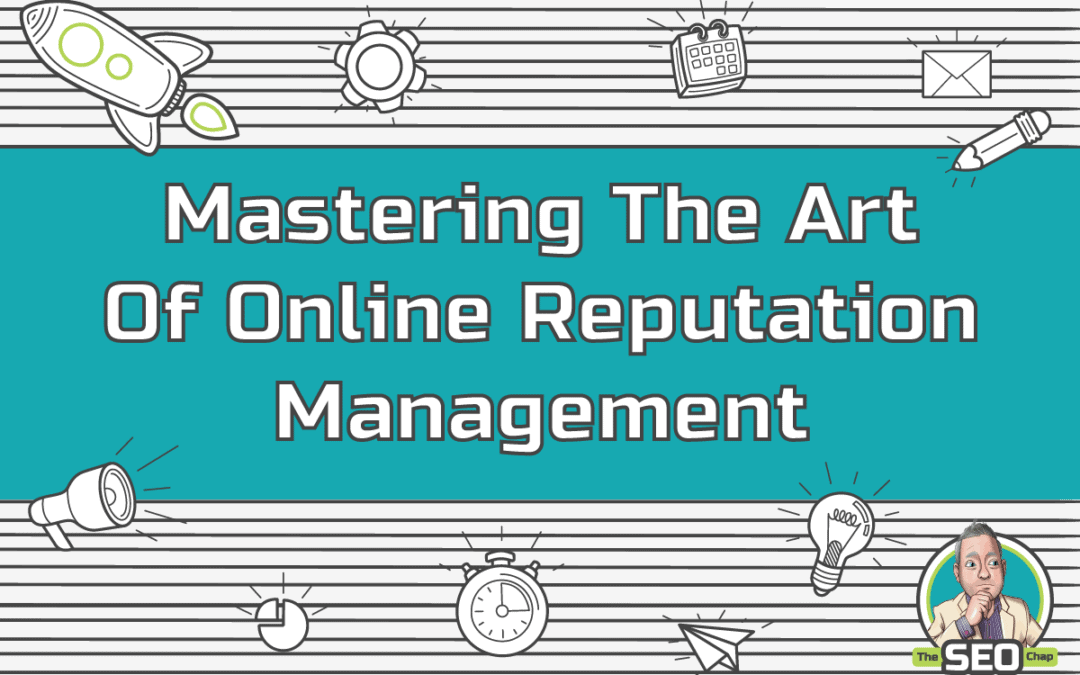As a business owner, managing my online reputation is an important part of staying successful. It’s not enough to simply rely on word-of-mouth or traditional advertising. With the rise of social media and review sites, I need to be proactive in monitoring and responding to what people are saying about me online.
In this article, I’ll cover the steps I can take to master the art of online reputation management. From creating positive content and engaging with my audience, to leveraging social media platforms and utilising reputation management services, I’ll explore all the available options for keeping my online presence strong.
Understanding the Art of Online Reputation Management
Gaining control of your public image is key to success in today’s digital world and master the art of online reputation management. Online reputation management (ORM) is the practice of monitoring, analysing, and influencing how people perceive you or your business online. ORM helps manage a company’s brand and identity by ensuring that any information posted on the web reflects positively on their product, service, or individual.
With an increasing number of consumers relying on search engines to make decisions about purchases and services, it’s more important than ever to stay relevant and build trust with customers.
The art of online reputation management works by actively monitoring what information appears when someone searches for you or your company via search engine results pages (SERPs). It also involves creating content that will be beneficial for users searching for related topics while reinforcing positive messages about you or your organisation.
This can include writing blog posts, creating social media accounts dedicated to promoting positive messaging, responding to customer reviews in a timely manner, and addressing any negative mentions quickly.
By taking proactive steps to analyse what people are saying about you online as well as engaging with those who have already taken the time to speak up, you can ensure that your digital presence is proactively managed so that it accurately reflects who you are and what you stand for. This will help create a more balanced picture of yourself or business’s image online, which, in turn, can lead to increased customer loyalty and conversions.
Monitoring Your Online Reputation
Staying on top of your online presence is essential – don’t let your reputation take an unexpected hit, being unaware simply isn’t an excuse! Monitoring your online reputation is the key to staying alert and managing criticism.
This involves regularly searching for any mentions of yourself or your brand across the internet, such as blog posts, comments, reviews, etc. You can use a variety of tools to help you keep track of what people are saying about you, as well as set alerts when anything new appears. Additionally, many software solutions provide further functionality like sentiment analysis and competitor monitoring. The monitoring softwares available to help you with this online and via social media are become very accurate in recent years, but remember things can rank online years after they have been published.
It’s also important to be proactive when it comes to managing your reputation. Responding quickly and appropriately to both positive and negative feedback can do wonders for how others perceive you online. Being proactive also allows you to respond swiftly if misinformation starts circulating – responding sooner rather than later may be the difference between containing a rumor or letting it spiral out of control.
Taking ownership over our online persona can seem daunting but with patience and dedication, it’s possible to make sure our virtual image is one we’re proud of! Whether that means being quick in responding to criticism or proactively creating content that reflects who we are – putting in the effort now will pay off in the long run!
Creating Positive Content
Crafting content that positively reflects who you are is essential to achieving a favorable online presence. Creating stories, blogs, and other content can help tell your story in an engaging way. Leveraging SEO techniques, such as including keywords into the text of your content and optimising for search engine algorithms, can also help ensure that potential customers find your stories when they search online.
By crafting positive content around yourself or your business, you can control how others view you or what they think about you. It’s important to provide accurate information and avoid exaggeration or false claims, as those could damage your reputation further if people find out the truth.
Engage with readers by responding to comments and messages on social media platforms, too, as it will help build relationships with them and potentially give them a good impression of you. Making sure the content you create is honest, interesting, relevant, and well-written will make sure that it stands out from all the other noise on the web and increase its chances of being seen over time. Of course, it doesn’t hurt to reach out to influencers in your niche, either, as their support could be invaluable for gaining more exposure for your brand, or even get involved in their conversations on social media.
Responding to Negative Reviews
Responding to negative reviews can be a tricky task, but with the right approach, you can turn an unhappy customer into a satisfied one. This is something I am passionate about for our brands and clients. It’s essential to address complaints quickly and professionally. This will show other customers that you take customer satisfaction seriously. When responding, include an apology and a solution for resolving the issue at hand.
Acknowledge the customer’s feelings, and make sure to keep any conversations private or in public forums depending on where it originated from. When addressing complaints online, it’s important to remain civil even if the customer has expressed their dissatisfaction in less than kind words. Let them know that you understand their frustration and offer solutions specific to their situation. Offer something of value by providing discounts or vouchers if applicable. This will show customers that you value them as individuals and are willing to do whatever it takes to make them happy again.
Being personal and proactive about addressing negative reviews is key when trying to maintain a positive online reputation. You should take responsibility for any issues that arise and offer assistance wherever possible in order to ensure your customers’ satisfaction with your services or products. By doing so, you can help rebuild relationships with existing customers while also gaining new ones who appreciate your commitment towards excellent customer service standards.
Building Relationships with Positive Influencers
Connecting with positive influencers is a great way to build relationships and increase your visibility online. Not only do you get the chance to network effectively, but it also gives you the chance to develop trust among industry experts.
Here are three ways to start building relationships with positive influencers:
- Reach out in a meaningful way. When sending an initial message, make sure you include something that’ll make them interested in learning more about you and what you offer.
- Establish yourself as an expert in your field by writing blog posts or articles that show off your unique knowledge and experience. If possible, add links within these pieces of content back to relevant resources or websites of the influencer, so they can easily find them when reading through your work.
- Attend events where influential people will be present so that you have the opportunity to introduce yourself and start conversations with those who may have a similar interest or expertise as yours. Through networking at these events, you can create relationships that could lead to collaborations down the line, which would help grow your reputation both online and offline!
Engaging with Your Audience
Engaging with your audience is key to fostering meaningful relationships and creating a lasting impact. To do this, it’s important to reach out to your followers as well as listen in to their conversations. Doing this may help you build an understanding of their needs, wants, and interests. You can then use this knowledge to create campaigns that speak directly to them.
By focusing on building strong relationships through two-way communication, you can develop trust with your audience and make sure that they stay engaged with your brand. And by taking the time to get to know who’s following you online and engaging in meaningful conversations, you can be sure that your message resonates with them. Be sure to regularly check up on social media posts or comments made by people who have interacted with your content before; not only does this show appreciation for their engagement but also helps identify potential areas for improvement or new opportunities for collaboration. Additionally, responding timely and effectively shows potential customers that you’re willing and able to provide assistance when needed – something people value highly in today’s digital world.
It’s essential for companies looking at online reputation management strategies that they understand the importance of engaging with their audience through proactive outreach efforts and listening activities – if done right, it can lead to increased customer loyalty, improved customer service experience, more effective marketing campaigns, and ultimately better overall reputation management success!
Leveraging Social Media Platforms
Leveraging social media platforms is like sailing the digital seas, carefully navigating to garner attention and build relationships. With a smart strategy for managing your online reputation, you can make sure your content reaches its intended audience and improves visibility. This means having a plan for when to post, what type of content you should be posting, and how often. It also means understanding your target audience to ensure that expectations are managed correctly.
An effective way to do this is by engaging with customers on social media in a positive way. You can respond quickly and efficiently to customer complaints or queries, show appreciation for their loyalty or feedback, and create meaningful conversations that will help build trust between your brand and potential customers. By taking the time to engage with customers on social media platforms, you can demonstrate your commitment to providing excellent service which will have a positive impact on how people view your business online.
Social media channels are an invaluable tool for building relationships with customers as well as managing online reputation. With careful planning and execution of an effective strategy, it’s possible to create opportunities for further engagement with potential customers while improving visibility of content across various platforms at the same time.
Utilising Reputation Management Services
Utilising reputation management services can help ensure your business is seen in the best light online, making it easier to attract customers and grow. Reputation management services provide proactive solutions by leveraging strategies such as monitoring online reviews and responding to customer inquiries. They can also help you create content that promotes your brand positively, engage with customers on social media, and address negative feedback quickly. This allows you to stay ahead of any potential issues that may arise online, helping protect your online reputation.
Having an effective reputation management system in place is essential for businesses today. It helps maintain a positive presence on the web and keeps customers informed about what’s going on with your business. With the right service provider, you can build trust with customers and keep them coming back for more.
Additionally, a good reputation can increase sales opportunities which will ultimately benefit your bottom line. Reputation management services are key when it comes to mastering the art of online reputation management. Investing in these services now will pay off in the long run, allowing you to better manage how people perceive your business online and improve customer satisfaction overall.
Conclusion
Managing the art of online reputation management is an essential skill for any business in the digital age. With the right strategies in place, you can build a positive presence online that will enable you to reach more customers and drive results.
By monitoring your online reputation, creating positive content, responding to reviews, building relationships with influencers, and engaging with your audience on social media platforms, you can cultivate a stellar image online. Taking advantage of available reputation management services can help ensure success as well. With these tips in hand, it’s time to start mastering the art of online reputation management!


